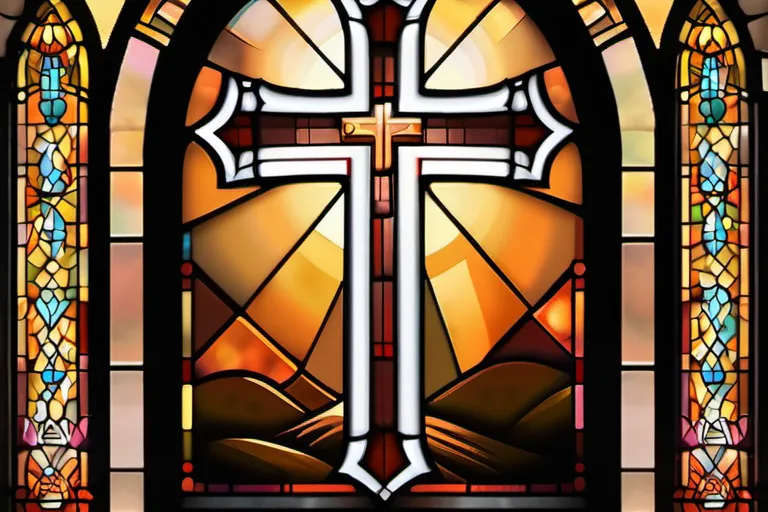Exploring the distinctive features of Christianity that set it apart from other major religions
Christianity, one of the world’s major religions, has a rich history and unique characteristics that distinguish it from other faiths. In this article, we delve into six key aspects that make Christianity stand out.
The Centrality of Jesus Christ
The Centrality of Jesus Christ: Explore the unique role that Jesus Christ plays in Christianity as the Son of God and Savior.
Is there anyone who hasn’t heard about Jesus? He’s like a universal symbol, present in art, music, literature, and culture worldwide. But what makes this man so distinctively central to Christianity among other religions? Could it be that he is not just a historical figure, but the very cornerstone of belief for millions?
Imagine building a house; without a solid foundation, the structure crumbles. In Christianity, Jesus Christ is the unshakable foundation. He’s more than just a religious leader; he’s described as the “Way, the Truth, and the Life” (John 14:6). This means that through him alone, believers seek to find meaning, truth, and eternal life.
Consider the metaphor of a ship in stormy seas. How do you navigate safely? With a lighthouse, right? In Christianity, Jesus is likened to this lighthouse—guiding souls through turbulent waters of life. He offers direction and hope when we feel lost or adrift.
Moreover, his teachings challenge us deeply. “Love your enemies and pray for those who persecute you” (Matthew 5:44) isn’t just a nice sentiment; it’s a radical call to transform our hearts and actions. This kind of love is not easy to emulate but forms the very essence of Christian living.
So, why does this unique role matter so much? It transforms us from mere spectators into active participants in God’s ongoing story of redemption. In embracing Jesus as Savior, we participate in a narrative that transcends our individual lives and connects us with an eternal community.
Is it any wonder then, that Christianity stands out among religions when its central figure is both a savior and a guide? This unique role of Jesus Christ defines not just the beliefs but also the very essence of Christian faith. Could there be a more compelling reason to explore this central figure further?
The Holy Trinity: Father, Son, and Holy Spirit
Imagine walking into a vast, diverse landscape where many paths lead to different destinations. In this landscape, Christianity stands out like a towering mountain, unique in its topography and significance. What is it that makes Christianity so distinct? One of the key elements lies in the concept of the Holy Trinity: Father, Son, and Holy Spirit. This belief is not just a theological curiosity but a core pillar that sets Christianity apart from other major religions.
How can three persons be one God? It’s a question that has puzzled minds for centuries. The Holy Trinity is often compared to a river that flows in three distinct streams yet remains the same water. In this metaphor, the Father represents the source of the river, the Son symbolizes the flowing current, and the Holy Spirit is like the mist that rises from the waters. Each element exists independently but also interdependently, creating an intricate dance of unity and diversity.
Many religions believe in a single divine entity or multiple gods. Christianity introduces the concept of three persons being one Godhead. This belief challenges our understanding of divinity and invites us to think beyond conventional boundaries. It’s as if Christianity is painting with a triptych brush, adding depth and complexity where simpler designs might suffice.
Reflect for a moment on the implications of this unique doctrine. How does it affect one’s view of God? Does it bring a sense of richness or confusion to your spiritual journey? The Holy Trinity invites us to see God in more than just a singular form, embracing the complexity and depth of His nature.
So, why is the Holy Trinity so pivotal for Christians? It’s not just an academic exercise but a lived experience. Through baptism, we are immersed into this divine trinity, connecting with the Father, Son, and Holy Spirit in a profound way. This belief shapes Christian worship, prayer, and understanding of God’s love and presence.
As you explore the Holy Trinity further, consider how it impacts your faith. Is there a part of this doctrine that resonates deeply with you, or perhaps raises questions? The journey through these beliefs is both enriching and challenging, making Christianity truly unique among major religions.
The Bible as the Sacred Text
The Bible as the Sacred Text: A Unique Treasure in Christianity
Imagine a library filled with countless books, each one holding different stories and beliefs. Now, picture a single book that has shaped a whole religion for nearly two thousand years – this is what the Bible means to Christians. But why does it stand out among other religious texts? What makes the Bible so significant in Christianity?
Firstly, let’s look at its historical context. The Bible is not just a text; it’s a journey through time, documenting a people’s history and their relationship with God. Unlike many other sacred books that may have been written much later or under different circumstances, the Bible presents itself as a continuous narrative from ancient times to the present day. This gives Christians a sense of continuity and connection with their faith’s past.
Moreover, the Bible offers a unique perspective on morality and ethics. It provides a detailed set of guidelines that go beyond just religious practices, influencing every aspect of life. For instance, the Ten Commandments provide clear rules for living, while the teachings of Jesus in the New Testament explore deeper ethical questions about compassion, forgiveness, and love.
Another distinctive feature is its divine authorship. Christians believe the Bible was inspired by God through various human authors over centuries. This idea sets it apart from other texts that are purely human creations or compiled by communities over time. The belief in divine inspiration infuses the text with a sense of authority and authenticity.
Lastly, the Bible’s impact extends beyond its pages. It has influenced literature, art, and culture across the globe. Its stories have been retold countless times, inspiring artists, writers, and thinkers for centuries. This universal reach makes it not just a religious text but also a cultural artifact that transcends time and place.
So, why does this single book hold such a central role in Christianity? It’s because the Bible isn’t just a collection of stories; it’s a living, breathing entity that continues to guide and inspire believers around the world. Its unique combination of history, teachings, and divine inspiration makes it irreplaceable in Christian life and faith.
The Role of Grace and Faith
Imagine a journey through different landscapes, each one offering its unique beauty and charm. Now, picture Christianity as one such landscape, standing out amidst other major religions with its distinct features like a rare, sparkling gem among pebbles. What makes this particular landscape so captivating? It’s the role of grace and faith that set it apart.
Grace and faith in Christianity are often compared to wings, enabling believers to soar beyond their limitations and reach heights they never thought possible. But how does this compare with other religions’ beliefs about salvation?
In many traditions, the path to salvation is seen as a rigorous journey of self-improvement or adherence to certain practices and teachings. However, Christianity shifts focus to grace, a divine gift that transcends human effort. This means believers don’t need to earn their way into God’s favor; they receive it freely through faith.
Consider this: If other religions emphasize the weight of one’s actions, Christianity places its emphasis on the lightness of God’s grace. It’s like comparing carrying a heavy load versus floating effortlessly in a stream. Grace is not just about forgiveness or redemption; it’s also about empowerment and assurance that one is loved unconditionally.
Moreover, faith acts as the compass guiding Christians on this journey. While other religions often require strict adherence to doctrines and rituals, Christianity encourages personal relationship with God. This intimate connection fosters a sense of trust and reliance on divine guidance rather than solely relying on one’s own efforts.
By exploring these concepts, we see how grace and faith offer a unique framework for understanding salvation that distinguishes Christianity from other major religions. It’s not just about reaching a destination but experiencing the journey itself, marked by moments of divine favor and continuous support.
The Sacraments: Symbols of God’s Presence
The sacraments are like hidden treasures, scattered throughout the Christian journey, each one a symbol of God’s presence and grace. Imagine you’re walking through a lush forest, and every now and then, you stumble upon a small, sparkling stream. Each stream represents a sacrament in Christianity—each one a refreshing encounter with the divine.
Why are there seven sacraments unique to Christianity? Could it be that each one is designed to mark significant moments on the path of faith, just as milestones guide us through life’s journey? Baptism, for instance, is like the first step into a new world. It signifies death and rebirth, much like stepping into a river where the old self is washed away and a new one emerges. Confirmation follows, like the moment when you’re given wings to soar higher in your spiritual journey.
Communion is perhaps the most symbolic of all. It’s not just about eating bread and drinking wine; it’s an act of remembrance. It reminds us that Jesus’ sacrifice was for our sins, just as a candle remembers the fire from which it originated. Reconciliation is like a healing balm for the wounds we inflict on ourselves and others. It’s where forgiveness meets mercy, making space for restoration in broken relationships.
Marriage is another sacrament, a sacred union that binds two hearts together, reflecting God’s love for His people. It’s not just about love; it’s about commitment and partnership before the Lord. Holy Orders is perhaps the most mysterious of all, representing the call to serve and lead within the Church community. Just as a key unlocks a door, ordination grants access to spiritual gifts and responsibilities.
These sacraments are more than just rituals; they’re living symbols that speak of God’s love in tangible ways. Each one weaves into the fabric of our faith, making the abstract concepts of grace and salvation concrete through their very existence. In a world full of uncertainties, these sacraments provide us with landmarks to navigate life’s storms, reminding us that no matter where we are or what challenges we face, God is always present in His unchanging love.
Christianity’s Global Impact and Diversity
Imagine Christianity as a vast ocean, flowing through continents and across centuries, shaping cultures and communities along its journey. What makes this body of faith unique among major religions? One significant factor is its global impact and diversity. From the cradle of Jerusalem to the bustling streets of New York, Christianity has left an indelible mark on the world.
Consider the diverse denominations within Christianity—think of them as different rivers branching off from the same source. Why does this fragmentation exist? It reflects a deep commitment to individual interpretation and spiritual exploration. Take, for instance, the differences between Roman Catholicism’s structured hierarchy and Protestantism’s emphasis on personal faith and scripture. Each branch nurtures its unique practices yet remains part of the vast Christian tapestry.
The global spread of Christianity is another hallmark that sets it apart. From the ancient missionary work in Asia Minor to the modern-day evangelistic efforts worldwide, the religion has adapted and thrived in myriad settings. The diversity in liturgical styles, languages, and cultural expressions is a testament to its resilience and ability to integrate with local traditions.
Moreover, Christianity’s response to social issues often reflects its unique values. Whether it be advocating for human rights, fighting against poverty, or promoting environmental stewardship, Christians across denominations often rally behind these causes, drawing on their faith’s teachings of compassion and justice.
In essence, the global impact and diversity of Christianity are not just reflections of its adaptability but also testaments to a faith that continues to evolve while maintaining core beliefs. How can such flexibility coexist with unchanging truths? This question speaks to the complex nature of Christian theology and its enduring appeal across generations and geographies.
This chapter, like its predecessors, delves into Christianity’s distinct features but now shifts focus to the expansive influence and varied practices that make it a global phenomenon. From sacraments to denominations, each facet contributes to a rich tapestry of faith that continues to shape the world in profound ways.
Conclusion
 By understanding these distinctive features, readers will gain a deeper appreciation for the diversity and complexity of world religions, as well as a greater insight into the unique nature of Christianity.
By understanding these distinctive features, readers will gain a deeper appreciation for the diversity and complexity of world religions, as well as a greater insight into the unique nature of Christianity.











